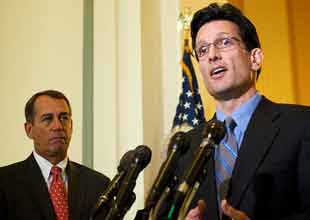The House of Representatives voted 239 to 160 on Wednesday, along party lines, to eliminate public financing for presidential elections. The bill to axe the Presidential Election Fund, as it’s known, was brought to a vote without any committee hearings or expert testimony, and after only a day’s worth of floor debate. Rep. Chris Van Hollen (D-Md.), a staunch advocate of public financing, has called the move “a sneak attack on the system.” Campaign reform advocates have likewise decried the financing repeal vote, saying it would usher in a new Watergate-like era where special interests—not regular voters—decide who wins and loses in American elections. “House Republicans voted to turn the presidency over to influence-seeking big donors, bundlers, and corporate and other outside spenders,” said Fred Wertheimer, president of Democracy 21, in a statement.
The public financing bill now moves to the Senate, where it’s unlikely to gain traction because Democrats still hold a slim majority.
As I reported on Monday, the presidential public financing system, which also funds party conventions, emerged from the Watergate scandal in the 1970s. After it was revealed that Richard Nixon’s re-election campaign had illegally accepted donations from big corporations, Congress created a public financing system that would encourage small donations and reduce the influence of special interests. Except for Barack Obama, every presidential candidate, Democratic and Republican, since 1976 has used the system.
Campaign finance reformers said it is crucial to reform public financing, not eliminate it. “Imagine if you didn’t make any changes to the tax code since 1976. Of course public financing is outdated,” said Meredith McGehee, policy director at the Campaign Legal Center. “The issue, then, is not to get rid of, but how to fix.” Indeed, both Democrats and Republicans have previously supported fixing the system, as I noted on Monday:
Legislation to make presidential public financing more competitive has won support from both parties in the past. In 2003, Sens. Russ Feingold (D-Wisc.) of and John McCain (R-Ariz.) introduced a bill that would reform the public financing system; Reps. Christopher Shays (R-Conn.) and Marty Meehan (D-Mass.) filed a companion bill in the House. “The public financing system for presidential elections, which aims to allow candidates to run competitive campaigns without becoming overly dependent on private donors, is a system worth improving and preserving,” the lawmakers said in a joint statement.













